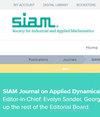基于回归投影的Mori-Zwanzig算子学习
IF 1.8
4区 数学
Q2 MATHEMATICS, APPLIED
引用次数: 4
摘要
我们建议采用统计回归作为投影算子,以实现Mori-Zwanzig形式中算子的数据驱动学习。我们提出了一种有原则的方法来提取任何回归模型的马尔可夫算子和记忆算子。我们证明了线性回归的选择导致了最近提出的基于Mori投影算子的数据驱动学习算法,这是一种高阶近似Koopman学习方法。我们表明,更具表现力的非线性回归模型自然地填补了高度理想化和计算效率高的Mori投影算子和最优但计算上不可行的Zwanzig投影算子之间的空白。我们进行了数值实验,并为一系列基于回归的预测提取了算子,包括线性、多项式、样条和基于神经网络的回归,随着回归模型复杂性的增加,结果显示出了逐步改善。我们的命题提供了一个一般框架来提取依赖于记忆的修正,并且可以很容易地应用于文献中固定动力系统的一系列数据驱动的学习方法。本文章由计算机程序翻译,如有差异,请以英文原文为准。
Regression-Based Projection for Learning Mori–Zwanzig Operators
We propose to adopt statistical regression as the projection operator to enable data-driven learning of the operators in the Mori–Zwanzig formalism. We present a principled method to extract the Markov and memory operators for any regression models. We show that the choice of linear regression results in a recently proposed data-driven learning algorithm based on Mori’s projection operator, which is a higher-order approximate Koopman learning method. We show that more expressive nonlinear regression models naturally fill in the gap between the highly idealized and computationally efficient Mori’s projection operator and the most optimal yet computationally infeasible Zwanzig’s projection operator. We performed numerical experiments and extracted the operators for an array of regression-based projections, including linear, polynomial, spline, and neural network–based regressions, showing a progressive improvement as the complexity of the regression model increased. Our proposition provides a general framework to extract memory-dependent corrections and can be readily applied to an array of data-driven learning methods for stationary dynamical systems in the literature.
求助全文
通过发布文献求助,成功后即可免费获取论文全文。
去求助
来源期刊

SIAM Journal on Applied Dynamical Systems
物理-物理:数学物理
CiteScore
3.60
自引率
4.80%
发文量
74
审稿时长
6 months
期刊介绍:
SIAM Journal on Applied Dynamical Systems (SIADS) publishes research articles on the mathematical analysis and modeling of dynamical systems and its application to the physical, engineering, life, and social sciences. SIADS is published in electronic format only.
 求助内容:
求助内容: 应助结果提醒方式:
应助结果提醒方式:


